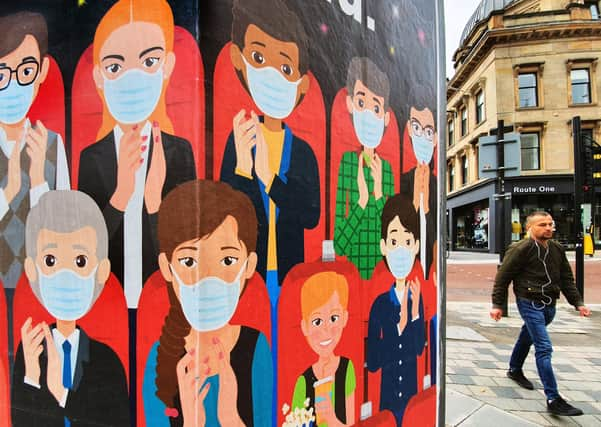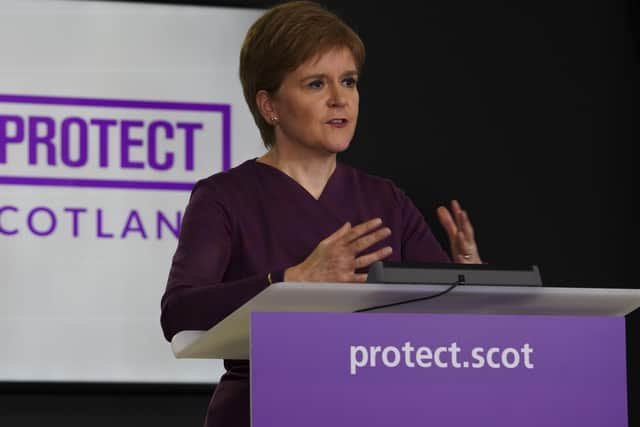Nicola Sturgeon and Boris Johnson in Cobra meeting ahead of new lockdown restrictions being announced


The measures will follow a stark forecast the UK could see 50,000 new Covid cases a day by mid-October without further action. The UK government’s chief scientific adviser, Sir Patrick Vallance, added that this would be expected to lead to around “200-plus deaths per day” the following month.
The Cobra meeting comes after the First Minister said she would announce the new restrictions to MSPs today or tomorrow. They could be in place for up to six months over winter and a normal Christmas is unlikely, Ms Sturgeon said.


Advertisement
Hide AdAdvertisement
Hide AdThe meeting also follows calls at the weekend for the UK government to discuss a four-nations approach to new restrictions. At her daily coronavirus briefing, the First Minister expressed frustration at the UK government’s slowness in agreeing a time and date for the Cobra meeting ahead of a phone call with Mr Johnson yesterday afternoon.
After the call, a Downing Street spokesperson said Mr Johnson and Ms Sturgeon had agreed to take a “united” approach with the new restrictions. Mr Johnson also spoke separately to Welsh First Minister Mark Drakeford and Northern Ireland First Minister Arlene Foster.
“During these calls, the Prime Minister made clear that the rising infection rates are a cause for great concern, which he is taking very seriously,” the spokesperson said.
“He reiterated his unwavering commitment to working with the devolved administrations as we continue to tackle the virus. They all agreed to act with a united approach, as much as possible, in the days and weeks ahead.”
Options under consideration are understood to include the closure of hospitality and further restrictions on household mixing.
Ms Sturgeon said: “We may be living for six months or that kind of time, I am not being absolutely definitive about that, where we need to have some kind restrictions.
“But it is not necessarily the case that we will be living under the same restrictions for a period of six months.
“It may be that we need to have variations and we will have periods where we can have fewer restrictions and periods where we may need more restrictions.
Advertisement
Hide AdAdvertisement
Hide Ad“Nobody can be definitive about this. Often we end up talking about time periods which, to some extent, are uncertain. We’re trying to give people as much of a degree of forward visibility as we can in an uncertain situation.
“Of course, six months takes us beyond the winter period as well where we know there are particular challenges in terms of transmission of the virus.”
Christmas ‘may not be normal’
Ms Sturgeon said Scotland may not see a return to normality in time for Christmas and that she was “reluctant” to make any clear promises or provide a timescale.
She added that Scotland had already experienced important religious holidays such as Eid and Rosh Hashanah during the pandemic.
“This is a very uncertain and volatile situation,” she said.
“I am very reluctant standing here in mid to late September to make definitive predictions about Christmas because I know how important Christmas is to people.
“Remember there’s a whole swathe of our population have already, like our Muslim community has already gone through Eid without being able to celebrate properly.
“Some people have already had important celebrations that they have not been able to enjoy.
Advertisement
Hide AdAdvertisement
Hide Ad“Christmas really matters to people and we want it to be as normal as possible but we are in a global pandemic.”
The First Minister added that it was still in the hands of Scots as to whether Christmas can be spent with family, with a clearer picture likely closer to the time.
Ms Sturgeon said: “As we get closer to Christmas we will have a better idea of what might be and what might not be possible.”
Scotland’s chief medical officer Dr Gregor Smith said that the chance of a vaccine being widely available in Scotland within the next six months was unlikely.
He added it “would not be wise” to hope a vaccine would arrive and bail the country out of more prolonged restrictions over the winter.
Dr Smith said: “Those vaccines are still going through the tests of effectiveness and safety. As I have said on many occasions, there are some very encouraging signs in terms of the progress we are making with those vaccines.
“Over the next six months we’re in a period where there is likely to be a much higher risk of transmission.
“We can’t look at a vaccine as a way out of the situation that we find ourselves in.”
Alert level raised
Advertisement
Hide AdAdvertisement
Hide AdThe UK’s four chief medical officers later recommended raising the Covid alert level from three to four – the second highest – indicating the “epidemic is in general circulation; transmission is high or rising exponentially”.
Sir Patrick said there was “no doubt” the UK was seeing increasing cases of Covid-19 among all age groups.
He said it was “not a prediction” but the current doubling of cases every seven days could lead to a dramatic rise in hospitalisations and deaths.
England’s chief medical officer, Professor Chris Whitty, suggested that reducing social contacts was a key way to curb the spread but acknowledged there was a balance to be struck in terms of protecting the economy.
He said: “If we do too little, this virus will go out of control and you will get significant numbers of increased direct and indirect deaths. But if we go too far the other way, then we can cause damage to the economy which can feed through to unemployment, to poverty, to deprivation – all of which have long-term health effects, so we need always to keep these two sides in mind.”
He suggested that science would eventually “ride to our rescue” but “in this period of the next six months, I think we have to realise that we have to take this, collectively, very seriously”.
A message from the Editor:
Thank you for reading this story on our website. While I have your attention, I also have an important request to make of you.
The dramatic events of 2020 are having a major impact on many of our advertisers - and consequently the revenue we receive. We are now more reliant than ever on you taking out a digital subscription to support our journalism.
Advertisement
Hide AdAdvertisement
Hide AdSubscribe to scotsman.com and enjoy unlimited access to Scottish news and information online and on our app. Visit https://www.scotsman.com/subscriptions now to sign up.
By supporting us, we are able to support you in providing trusted, fact-checked content for this website.
Joy Yates
Editorial Director
Comments
Want to join the conversation? Please or to comment on this article.